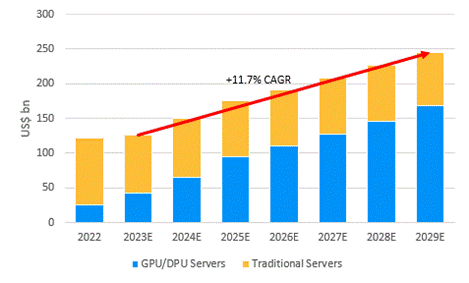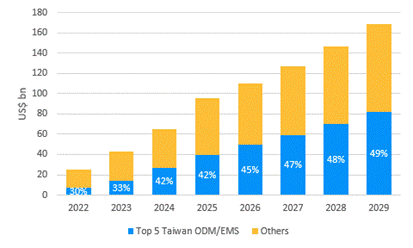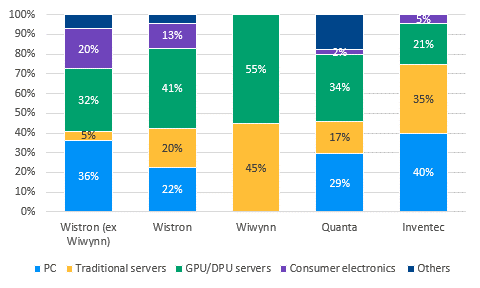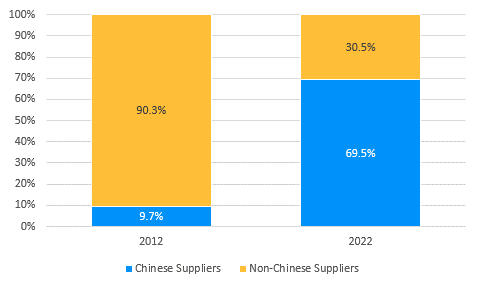When investors think of the technology sector, familiar names such as Google, Microsoft, and Apple are often the first companies that come to mind. Some household emerging market (EM) companies like Samsung, Infosys and TSMC may also enter the fray. However, the EM technology sector is far broader than that, being home to a number of world leading companies in spaces such as hardware, software, IT outsourcing, semiconductors, and cloud.
How J.P. Morgan Asset Management invests in technology
Information technology continues to be an increasingly important sector for EM investors. Indeed, the technology sector within EM has grown by a third over the past 10 years (from 15% to 20%1 of the MSCI Emerging Markets Index). Over that time, the composition of the sector has also evolved dramatically. As stock investors at J.P. Morgan Asset Management, we have and continue to exploit the opportunity that this presents. We firmly believe in the need to drill into company specifics and fundamentals when understanding the right companies to own.
There are two key factors we take into consideration when we invest in technology. First, we look for those companies that are beneficiaries of major trends – for example greater demand for semiconductors or artificial intelligence (AI). Second, we understand technology is a never-ending evolution and there is always something new on the way. We want to ensure that we are aware of those companies involved in the next major trend, and to understand whether they have the ability to grow market share while remaining profitable.
However, the technology sector, perhaps more than any other, has a history of false dawns. This is where specific technologies – and the companies that are aligned to them – are expected to be the next winner within the sector but ultimately fail to deliver on their promise over a long-term investment horizon. Yet, the strength and depth of our investment team has often afforded us the ability to find winners by applying a rigorous and consistent research framework to best evaluate the pool of opportunities.
An example of how we leverage this investment process is shown by our investment in Infosys, an IT outsourcing company in India. Infosys has been a beneficiary of a major trend we identified around 30 years ago - the increasing global demand for software, and the resulting need for people who can write said software. India is a region that has been particularly good at training software engineers and Infosys has been a market leader in this space. Not only does Infosys provide its clients access to the most talented software engineers, but the company also meets our quality threshold. Infosys is cash generative and has an experienced management team used to dealing with Fortune 500 companies.
AI is fuelling investment opportunities
While IT outsourcing has been a rewarding investment, it is not typically the type of business that many associate with the technology sector. AI, on the other hand, has generated great excitement globally. Interest peaked in 2023 with the introduction of ChatGPT and other similar models, yet generative AI has been progressing for several years. More importantly, at the heart of its development are many emerging market companies. How the technology continues to evolve from here will determine which companies will be the winners from its proliferation. We believe many of them could lie within emerging markets.
Like other technologies, such as the internet, smartphones and electric vehicles, AI has the potential to revolutionise many industries beyond just the technology sector. Various companies today are already using AI in a number of different ways (such as smart manufacturing or for anti-money laundering in finance). AI can open up new business models for companies in various sub-sectors.
Given the wide reach of AI, spending on GPU (Graphics Processing Unit) and DPU (Data Processing Unit) servers are expected to grow significantly. These servers are central to the accelerated data processing required to train AI models. Our estimates show that spending on these servers will outstrip traditional CPUs (Central Processing Units) by 2025 and continue to grow in the following years. This trajectory is demonstrated in Exhibit 1 below.
Exhibit 1: GPU and DPU server spend accelerating to facilitate AI technology

Much of this demand can be met by EM companies. Taiwan holds a competitive advantage in the AI global server market and we forecast that just the top five Taiwanese suppliers could eventually supply almost half of the entire market by 2029 (see Exhibit 2).
Exhibit 2: Taiwan’s top five server makers are forecast to supply almost half the market

Finding the winners in AI
We believe that the long-term winners in AI all share one common feature: early investment in research and development (R&D). The early adaptation of this technology means these companies are far ahead of their competitors in leveraging newer evolutions. Two names to highlight in EM are cloud IT infrastructure provider Wiwynn and PC company Quanta Computing, both from Taiwan.
Wiwynn, a global cloud-enabling service company, is a pure play on AI server production. Wiwynn has gained significant market share and signed high profile customers including Amazon. The company is well placed to improve margins over time and should continue to benefit from the growth in demand for AI servers.
Quanta Computing is one of the largest manufacturers of traditional servers and electronic hardware globally. It was one of the earliest companies to start hiring software engineers (2014/2015) to research GPU servers and other AI components. Its strong management team has also helped drive the company to leading positions in PC, internet, cloud and AI markets, with automobile computing a possible area of future growth.
The diversified nature of these businesses, as well as the growing adoption of newer technologies, is shown in Exhibit 3.
Exhibit 3: Business breakdown of Wiwynn and Quanta

AI supply chain advantage
Another advantage that EM companies have is that they often play a significant role in the supply chain of the large international players leading the technology sector. Nvidia is perhaps the best known AI company in the world and since shifting its business to focus on this technology, has increasingly looked to China for its supplies.
As AI workloads place increasing pressure on bandwidth to transfer data quicker and more reliably, ethernet transceivers play a crucial role to bridge this gap. The technology is essential to scale the AI story and China has leveraged the opportunity to supply an increasing part of the market (see Exhibit 4).
Exhibit 4: China suppliers’ ethernet transceiver market share

As touched on previously, it is well known that Nvidia has seen a meteoric rise in the past year or so following the explosion of interest in AI. However, far less known, is that the top five Chinese original equipment manufacturers for traditional servers are in fact the same top five providers for AI servers. This illustrates the benefit these EM companies have gained from investing in the technology much earlier. Their leading positions in traditional servers have given management a better view of future trends. Given their success in the traditional market, they were able to invest in new technologies even when there were no immediate returns to be made as their businesses were sufficiently diversified to be making money elsewhere.
Broad array of opportunities beyond AI and Asia
Asia is often seen as the epicentre for finding cutting edge tech businesses. Yet, when we apply our research process across the asset class, we also find compelling investment opportunities in other regions. For example, Globant is a software developer producing innovative digital products based in Argentina. We discovered the business as a small cap 10 years ago and it has now grown into one of the leading players in the space. The company has a real focus on newer technologies, including providing advice on AI to corporates around the world. Globant’s client list includes the likes of mega caps Alphabet, Uber and Disney. In fact, the company was fundamental in transforming how Disney customers experienced the various Disney theme parks through their apps.
Another example is South Africa’s Capitec. From the humble beginnings a little over two decades ago, the bank (which name is derived from Capital and Tech) has grown into a top retail banking franchise in the country, serving over 20 million clients. Its business is built around simple and cost-efficient products with transparent pricing for its clients. However, technology has been the key enabler. Automation has helped keep the company’s banking processes simple, while the promotion and migration to digital banking has saved costs for both the business and its customers. The number of digital clients is up to around 12 million from c.7 million in 2019, illustrating the strength of the company’s technology strategy.
Conclusion
Technology by nature evolves rapidly, although that does not mean that there are necessarily a vast amount of credible, long-term investment opportunities in respect of new entrants. A history of any industry is also a history of the many failed businesses, amongst the few successful businesses, who had the ideas but not necessarily the economic strength. You only have to look at a list of the top 10 semi-conductor design companies in Taiwan in 1999 to see only three have remained in the top 10 today (Mediatek, Realtek and Novatek). The opportunity as investors is in the companies that continue to evolve their products and businesses. As we look to the future, we also anticipate that in EM, the technology companies that have historically been the suppliers to the large international names, may well emerge as the winners themselves.
J.P. Morgan Asset Management’s investment trust offering includes two emerging market trusts.
The companies above are shown for illustrative purposes only. Their inclusion should not be interpreted as a recommendation to buy or sell.
1 Source: MSCI, MSCI Emerging Markets Index (USD), as of 30 September 2023.
More Insights
This is a marketing communication. The views contained herein are not to be taken as advice or a recommendation to buy or sell any investment or interest thereto. Reliance upon information in this material is at the sole discretion of the reader. Any research in this document has been obtained and may have been acted upon by J.P. Morgan Asset Management for its own purpose. The results of such research are being made available as additional information and do not necessarily reflect the views of J.P. Morgan Asset Management. Any forecasts, figures, opinions, statements of financial market trends or investment techniques and strategies expressed are, unless otherwise stated, J.P. Morgan Asset Management’s own at the date of this document. They are considered to be reliable at the time of writing, may not necessarily be all inclusive and may be subject to change without reference or notification to you.
The value of investments and the income from them may fluctuate in accordance with market conditions and investors may not get back the full amount invested. Past performance and yield are not a reliable indicator of current and future results. There is no guarantee that any forecast made will come to pass.
J.P. Morgan Asset Management is the brand name for the asset management business of JPMorgan Chase & Co. and its affiliates worldwide.
To the extent permitted by applicable law, we may record telephone calls and monitor electronic communications to comply with our legal and regulatory obligations and internal policies. Personal data will be collected, stored and processed by J.P. Morgan Asset Management in accordance with our EMEA Privacy Policy www.jpmorgan.com/emea-privacy-policy.
This communication is issued in Europe (excluding UK) by JPMorgan Asset Management (Europe) S.à r.l., 6 route de Trèves, L-2633 Senningerberg, Grand Duchy of Luxembourg, R.C.S. Luxembourg B27900, corporate capital EUR 10.000.000. This communication is issued in the UK by JPMorgan Asset Management (UK) Limited, which is authorised and regulated by the Financial Conduct Authority. Registered in England No. 01161446. Registered address: 25 Bank Street, Canary Wharf, London E14 5JP.
09xy240401101517


